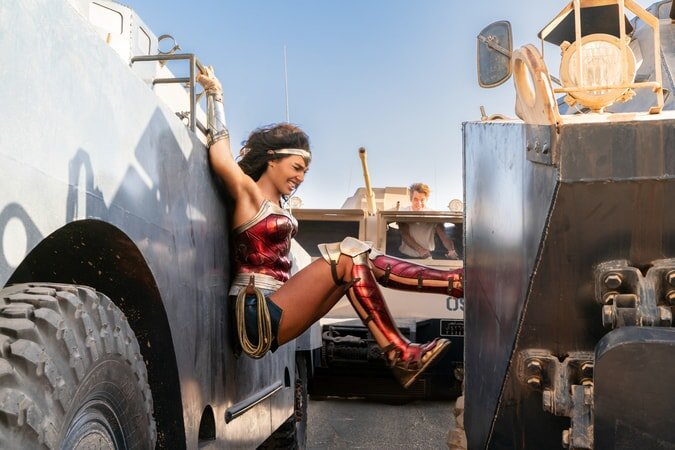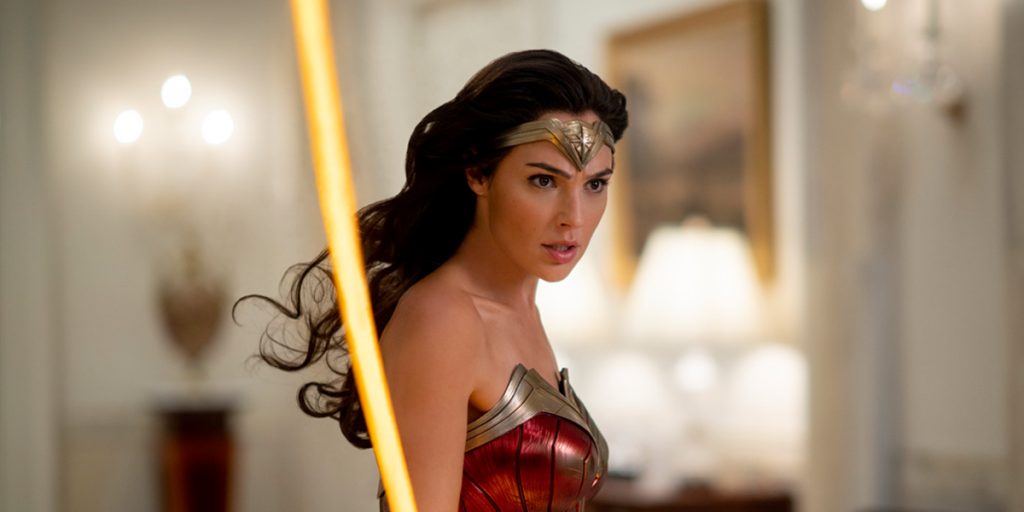Wonder Woman 1984 is the bombastic, big-hearted blockbuster we need after the terrors of 2020, even if it can’t quite surpass its subversive predecessor.
To put it lightly, Wonder Woman 1984 certainly hasn’t had the smoothest journey to the big screen. Originally intended for (theatrical) release this June – after flirting with a winter 2019 debut just a few months prior – it soon found itself forced to relocate when complications resulting from the COVID-19 pandemic caused theaters to close across the nation. It was optimistically moved to August, as many assumed that America would have control of the coronavirus by then (ha!), but when that date also proved to be a pipe dream, it was rescheduled again, this time for early October. And yet, as COVID-19 cases continued to rise, the film had to be pushed once more, finally to Christmas Day 2020, in the hopes of some return to normalcy by the holiday season. Still, that sadly hasn’t quite happened.
Therefore, Warner Bros. did the unthinkable when announcing a simultaneous day-and-date release for the superhero sequel this past November, allowing it to premiere in theaters and on the HBO Max streaming service at the same time. Though the fallout has been formidable (to say the least), for the time being, most fans are merely delighted that they finally get to witness the return of Wonder Woman after a three-and-a-half-year long absence, and honestly, who can blame them? After the woes of the “Worst Year Ever,” maybe a bright, big-budget blockbuster can offer some sort of escape from the suffering many families face day in and day out at the moment. Thankfully, Wonder Woman 1984 is indeed that soothing solace and so much more, capitalizing on what made its cherished predecessor so successful (if not ever surpassing that 2017 triumph) by further honing in on the heart of its heralded heroine and showcasing a story that is overflowing with stark sincerity and showy spectacle.

After a pulse-pounding prologue set during a chaotic Olympics-esque competition on the all-female island of Themiscyra, Wonder Woman 1984 picks up in the excitement and exuberance of the 80s, following Gal Gadot’s Diana Prince as she works in Washington D.C. curating ancient artifacts at the Smithsonian and handling her hero duties off-the-clock and “under-the-radar.” Here, she also becomes fast friends with Dr. Barbara Ann Minerva (Kristen Wiig, of Bridesmaids and Ghostbusters), an introverted archaeologist who wholly admires Diana – without knowing the real “wonder” of her new pal. While Diana has made a nice life for herself in the modern age, it’s hard for her to not feel forlorn about the loss of her love Steve Trevor (Chris Pine, of Star Trek and Into the Woods) seven decades prior, and it proves difficult to cultivate a meaningful connection with any other human that can compare to what she had with her favorite flyboy.
Enter the “Dreamstone,” a strange relic that Diana and Barbara are tasked with surveying over at the Smithsonian, with the two soon realizing that the rock seemingly has the power to grant wishes to any individual who comes into contact with it. Diana’s desire is simple and straightforward – to be reunited with Steve, no matter what it takes. Though her hopes are heard and Steve returns, when the “Dreamstone” is used by others, their intentions are much less innocuous. First, Barbara’s sense of self begins to shift rapidly after asking to be “more like Diana” – without fully understanding what her wish will bring – and then, the problems continue to pile on when the boastful businessman Maxwell Lord (Pedro Pascal, of The Mandalorian and Kingsman: The Golden Circle) steals the stone to procure power of untold magnitude, potentially causing worldwide calamity.
While Wonder Woman 1984 differs in tone from the more somber, self-serious war saga of its 2017 predecessor – choosing to instead bask in the brash brilliance of the 1980s and immerse audiences in the energy and euphoria of this exhilarating era – the sequel never loses sight of what makes the franchise such a fan-favorite – the spirited soul of its lively leading lady. Even when the story here – taken from a script written by director Patty Jenkins, Geoff Johns (Wonder Woman, Aquaman), and David Callaham (Zombieland: Double Tap, Godzilla) – hits a few snags at times over the course of its hefty 151-minute runtime (mostly related to the shuffling of its superfluous subplots), the inherent appeal of its powerhouse protagonist is always apparent, primarily thanks to Gadot’s continued charm in the titular role.
In fact, Diana’s arc in this follow-up is particularly affecting, depicting the intense isolation she feels as a woman-out-of-time struggling to progress from her past. When she’s offered a shortcut to satisfaction in the form of Steve’s resurrection, she jumps at the chance, but over time, she must realize that this wish not only comes with a mighty cost but also proves to be a pale imitation of what she truly wants. Does having Steve back truly alleviate her anguish, or does it just postpone her pain? This question forms the foundation of Wonder Woman 1984 as a whole, and despite the fact that Steve himself is somewhat shortchanged (with Pine still acting as a pleasant presence nonetheless), Gadot convincingly and compellingly charts Diana’s emotional evolution throughout the entire tale.
This “be careful what you wish for” advisory can also apply to Barbara and Max, both of whom receive thoughtfully textured characterizations as the script both highlights the horrors that their wishes bring about while additionally investigating the internal ills that cause each individual to make these choices. Even as both characters evolve into enemies of sorts for Diana to duel, they’re never robbed of their humanity or reduced to “sinister” stereotypes, instead always being afforded meaningful moments that offer explanations for their arguably treacherous actions. Pascal almost steals the show as the “Machiavellian” Max, never shying away from broad showboating as the businessman is further corrupted by his pervasive power and his gross greed (exemplifying the exhausting excess of the 80s), and though Wiig’s Barbara experiences a change in character that is far swifter by comparison – especially in regard to her conversion to her ultimate “feline form” as the chilling Cheetah – Wiig is still superb at tackling her transformation from “adorkable” archaeologist to resentful, insecurity-ridden rival.
As with any comic-book-based blockbuster, audiences watching Wonder Woman 1984 will likely be looking for suspenseful setpieces of staggering size and scale, and while this sequel isn’t quite as action-packed as its predecessor, director Patty Jenkins has nonetheless significantly improved her sense of scope here, captivating crowds right off the bat with that aforementioned Themiscyra-set adventure and shooting the Amazonians’ stuntwork with the appropriate style and splendor. She is aided considerably in all action scenes by the consuming and colorful cinematography of Matthew Jensen (Wonder Woman, Chronicle) and the earth-shattering score of Hans Zimmer (The Dark Knight, Inception) who help her permeate the picture with power and potency, but Jenkins’ most valiant victory here is in the film’s tempered third act, where she relies on the strength of her themes of compassion over conflict and empathy over enmity to round out this odyssey instead of a typical “fight”-driven finale. It’s a bold risk – and one that may catch some viewers off guard as they anticipate a more conventional conclusion – but it’s true to who Wonder Woman is as a character, and this passionate and purposeful preaching may be just what we need to hear after a year of such division and discord.
Wonder Woman 1984 trades in the sharpness of its predecessor for a story that is a bit “sillier” – and a tad too crowded as well, shortchanging a few supporting characters – but, in the end, Gal Gadot’s charm and charisma as the title character is as enthralling as ever, and the effervescent entertainment that director Patty Jenkins provides here is simply too ravishing to resist – especially in a year starved for blockbuster escapism like this. It’s an unabashed throwback to the epics of the era it inhabits, but it manages to still satisfy modern-day audiences all the same, with a continued commitment to showcasing the “softer” sides of superheroes and an emphasis on the power of communication over combat.
Wonder Woman 1984 will be released simultaneously in cinemas and on HBO Max on December 25, 2020.

